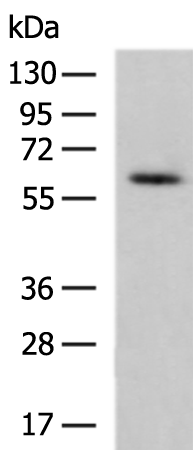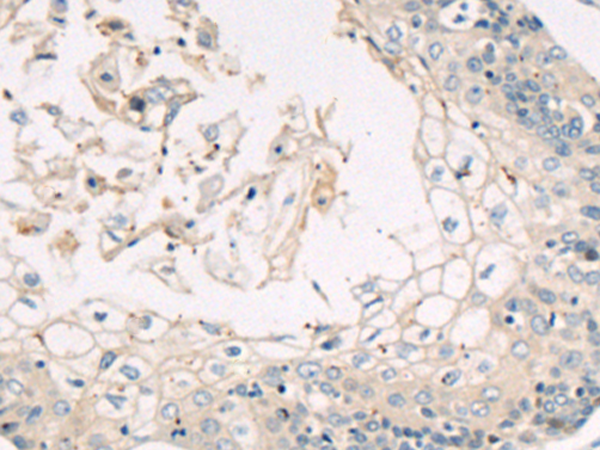

| WB | 1/500-1/2000 | Human,Mouse,Rat |
| IF | 咨询技术 | Human,Mouse,Rat |
| IHC | 1/50-1/100 | Human,Mouse,Rat |
| ICC | 技术咨询 | Human,Mouse,Rat |
| FCM | 咨询技术 | Human,Mouse,Rat |
| Elisa | 1/5000-1/10000 | Human,Mouse,Rat |
| Aliases | RNF85; MGC:3310 |
| WB Predicted band size | 60 kDa |
| Host/Isotype | Rabbit IgG |
| Antibody Type | Primary antibody |
| Storage | Store at 4°C short term. Aliquot and store at -20°C long term. Avoid freeze/thaw cycles. |
| Species Reactivity | Human, Mouse, Rat |
| Immunogen | Fusion protein of human TRAF6 |
| Formulation | Purified antibody in PBS with 0.05% sodium azide and 50% glycerol. |
+ +
以下是3篇与TRAF6抗体应用相关的文献摘要,供参考:
---
1. **文献名称**:*TRAF6 is a signal transducer for interleukin-1*
**作者**:Cao, Z. et al.
**摘要**:该研究通过免疫共沉淀(Co-IP)和Western blot技术,使用TRAF6抗体验证了TRAF6与IL-1受体复合物的相互作用,证明TRAF6在IL-1信号通路中作为关键接头分子,介导NF-κB和MAPK通路的激活。
---
2. **文献名称**:*Ubiquitination of TAB2/3 regulates TAK1 activation by TAK1-binding protein 2*
**作者**:Ishitani, T. et al.
**摘要**:文章利用TRAF6特异性抗体进行蛋白质相互作用分析,发现TRAF6通过K63泛素化修饰TAB2/3蛋白,促进TAK1激酶复合体的形成,进而激活下游炎症信号通路。
---
3. **文献名称**:*USP25 regulates TLR4/NF-κB signaling by deubiquitinating TAK1 and TRAF6 in macrophages*
**作者**:Wang, Y. et al.
**摘要**:本研究通过TRAF6抗体进行泛素化修饰检测,发现去泛素化酶USP25通过调控TRAF6的K63泛素链动态平衡,影响TLR4信号通路的强度,从而调节巨噬细胞的炎症反应。
---
**备注**:上述文献中,TRAF6抗体主要用于检测蛋白表达、相互作用及翻译后修饰(如泛素化)。具体实验方法需结合抗体品牌及实验设计进一步筛选。
TRAF6 (Tumor Necrosis Factor Receptor-Associated Factor 6) is a crucial adaptor protein involved in multiple signaling pathways, including NF-κB and MAPK activation, which regulate immune responses, inflammation, and cell survival. As a member of the TRAF family, TRAF6 functions as an E3 ubiquitin ligase, facilitating the assembly of signaling complexes through K63-linked polyubiquitination. It mediates signals from receptors like Toll-like receptors (TLRs), interleukin-1 receptor (IL-1R), and the TNF receptor superfamily, linking extracellular stimuli to intracellular signaling cascades.
TRAF6 antibodies are essential tools for studying its expression, post-translational modifications, and interactions in various biological contexts. These antibodies are widely used in techniques such as Western blotting, immunoprecipitation, immunofluorescence, and immunohistochemistry to investigate TRAF6's role in diseases like cancer, autoimmune disorders, and infectious diseases. Researchers rely on TRAF6-specific antibodies to assess its activation status, subcellular localization, and association with downstream effectors under different experimental conditions. Validated antibodies typically target conserved regions, such as the TRAF-C domain or N-terminal zinc-binding motifs, ensuring specificity across human, mouse, and rat samples. Quality control involves testing in knockout models or siRNA-treated cells to confirm minimal cross-reactivity. As dysregulated TRAF6 signaling is implicated in pathological processes, its antibodies also support drug discovery efforts targeting inflammatory and oncogenic pathways.
×